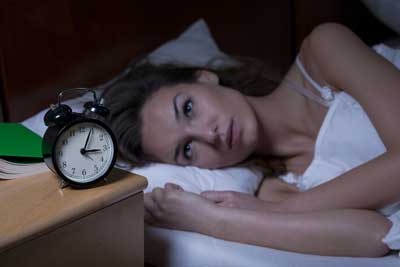

Sleep deprivation is common in fibromyalgia and it doesn’t just cause fatigue. Studies show that losing sleep increases your pain sensitivity as well, and quickly; it took just two nights of fragmented sleep to significantly increase pain sensitivity in healthy women.
Poor sleep is also associated with increased inflammation. In fact, one review proposes that sleep loss increases the risk of neurologic disorders such as stroke, multiple sclerosis, Alzheimer’s disease, headache, epilepsy and pain (FM and others) (but may protect against Parkinson’s (?)).

Poor sleep can increase fatigue, pain, inflammation and perhaps even the chance of coming down with a neurological disease.
Experimental models suggest that sleep loss increases amyloid deposition and thus may contribute to the onset of Alzheimer’s. Rather worryingly, given the fibrofog and brainfog in fibromyalgia and chronic fatigue syndrome (ME/CFS) patients, sleep/wake problems may be among the earliest signs of Alzheimer’s.
Several sleep issues, including reduced short-wave sleep and abnormal α-rhythms that bounce FM patients into a near wakeful state during sleep, are present.
The sleep problem in FM, though, is complicated by two facts. First, poor sleep impairs the activity of the same pain inhibiting pathways that are messed up in FM. While FM is not a sleep disorder, it’s possible, then, that sleep deprivation could be an entry point into FM.
Second, the painful muscles and points in FM can impair sleep as well. This means FM produces pain which can then impair sleep further. (Those painful points might be why a good mattress scored so high in a sleep survey Health Rising did.)
Given that poor sleep can result in both pain and fatigue, how to get better sleep has been an ongoing theme in FM and ME/CFS for years. Now comes a study from Boston Children’s Hospital and Beth Israel Deaconess Medical Center (BIDMC) which doesn’t directly help with sleep but may provide some with a surprising way to reduce the pain associated with poor sleep.
Breaking the Sleep / Pain Cycle?
Nat Med. 2017 May 8. doi: 10.1038/nm.4329. [Epub ahead of print] Decreased alertness due to sleep loss increases pain sensitivity in mice. Alexandre C1, Latremoliere A2,3, Ferreira A2,3, Miracca G2,3, Yamamoto M1, Scammell TE1, Woolf CJ2,3.
The study comes with a couple of provisos. It was a rodent study, so it may or may not in the end apply to humans. Plus, the mice didn’t have fibromyalgia or ME/CFS – so it may not apply to people with those diseases. What the mice did have, however, was increased pain sensitivity due to poor sleep – and that’s probably common in both diseases.
The researchers induced reduced sleep in a very human way. Thinking to mimic what happens to humans who want to catch one more TV show, the researchers entertained them into sleep problems by giving them a toy or a chewie as they were about to go to sleep. Like humans, the mice couldn’t resist – and ended up playing or chewing themselves into sleep deprivation.
Stimulants Better Than Morphine at Relieving Pain Associated with Sleep Deprivation
“This represents a new kind of analgesic that hadn’t been considered before. Such drugs could help disrupt the chronic pain cycle, in which pain disrupts sleep, which then promotes pain, which further disrupts sleep.” Woolf – study author
Over five or six days as their sleep debit and pain sensitivity increased, the researchers began to throw pain-relieving medications at the mice. Ibuprofen, an NSAID, had no effect. Morphine worked at first but then pooped out.

In a surprise caffeine does what opioids couldn’t – eliminate pain in sleep-derived laboratory animals.
Then two stimulants, caffeine and modafinil (Provigil), wiped out the mice’s signs of pain completely. Interestingly, caffeine and modafinil did not affect pain sensitivity in rested or sleep normal mice at all. These two stimulants seem most effective at reducing pain associated with sleep deprivation.
This study caught my eye because caffeine – even very small amounts (I am very sensitive to caffeine) – can at times do exactly the same thing for me. My pain, while probably mild compared to others, but still quite troublesome – will completely disappear for a time. ( I usually wake up exhausted to boot).
The reversibility of mild sleep-loss-induced pain by wake-promoting agents reveals an unsuspected role for alertness in setting pain sensitivity. Clinically, insufficient or poor-quality sleep may worsen pain and this enhanced pain may be reduced not by analgesics, whose effectiveness is reduced, but by increasing alertness or providing better sleep. Woolf et. al.
We don’t think of stimulants as pain relievers, but another animal study suggested that modafinil can reduce pain. Plus, because caffeine appears to potentiate the effects of antidepressants, acetaminophen and non-steroidal anti-inflammatory drugs, it’s often added to them. Caffeine’s ability to vasoconstrict cerebral blood vessels appears to be helpful in migraine. A small study found intravenous caffeine (60 mg caffeine citrate) was quite successful in aborting migraine attacks.
Caffeine and Provigil aren’t the only stimulants found to have at least some pain-reducing properties. Animal studies suggest that amphetamines can reduce pain as well. Adderall, which is composed of amphetamine and benzodiazepine salts, is known to reduce pain in some. Of course amphetamine’s addictive tendencies make them poor pain relievers, but their ability to temporarily relieve pain in some may be pointing at something.
Nobody knows why these stimulants help some people with pain, but several possibilities exist. Caffeine acts on anti-pain receptors called adenosine receptors, and it or other stimulants may enhance dopamine or noradrenaline levels.
While caffeine or other stimulants probably aren’t enough for really serious pain, they might help take off the edge for those in sleep-deprived pain. The study authors suggested the following protocol: take sleep inducing drugs at night (if necessary), and then caffeine or other stimulants during the day to “break the pain cycle”. That reduction in pain could help one to enter into deep sleep more easily at night.
(Of course, beware of taking any stimulant towards the end of the day)
Have Stimulants Helped You with Pain?
Find More Ways to Possibly Improve Sleep in our Sleep Resources Section including
- A Bed of Nails for Better Sleep? Acupressure Mats, Fibromyalgia, and Chronic Fatigue Syndrome
- Heads Up! An Easy Way to Improve Sleep for Fibromyalgia and Chronic Fatigue Syndrome (ME/CFS)
- New FDA Approved Device for Insomnia May be More Effective Than Drugs
- Preventing Sleep Apnea Therapy was Miracle Cure for Me
- The Health Rising Chronic Fatigue Syndrome and Fibromyalgia Sleep Survey
- Dr. Teitelbaum on Maximizing the Use of Sleep Drugs
- Check out our entire Sleep Resources for ME/CFS and FM section here
Health Rising is Supported Almost Entirely By Donations
Use the subscribe button on the right-hand side of the page to become a $5/month recurring donor







I have noticed a slight but definite difference in my pain levels when I started Modafinil–supposedly prescribed for ‘idiopathic hypersomnia’. My sleep specialist has MS. I really think my fatigue was more CFS/ME–but the two, sleepiness from lack of sleep, and fatigue from an ‘unknown’ factor (CFS/ME) are often so intertwined that it is hard to tell the difference. My doctor needed an approved Dx to give me that drug, hence ‘hypersomnia.’
I have had sleep issues for a long time mostly because of pain. Extended release opioids really do not give me the quality of sleep I need either. In my endless search for remedies for my misbehaving body, I finally took the plunge and tried kratom. I started very, very small and titrated up to about 3 grams, twice a day. It works so well, I have stopped all my round the clock opioid and all other pain control strategies. I don’t have the pain problems at night and wake up much more refreshed and clearheaded.
Of course, before trying kratom, I did A LOT of research. Unfortunately it is very understudied and at high doses has much potential for abuse. Also it is a bit problematic to know exactly what you are getting when ordering on-line. But so far, so good–at least for myself.
So, I offer up my experience as something to potentially help the suffering of both fibromyalgia and CFS/ME… but must always advise, proceed with caution and DO YOUR HOMEWORK!
Thanks for relaying your experience Nancy and congratulations on your really incredible improvement. I wonder what in Kratom is doing the job (??)
Well Cort, since you asked;
https://www.kratomscience.com/2014/10/08/list-alkaloids-identified-mitragyna-speciosa-kratom/
Nature still seems to be the better chemist…
Seems as if there is some amount of variation depending. Lower doses are purported to be stimulating and higher doses more relaxing. I must say, although kratom is quite effective for my pain, it still doesn’t completely conquer my problems with fatigue…
Thanks!
No fair! I can’t handle much caffeine at all. The most I can take is one tea bag in the AM…Even too much chocolate, (which definitely helps with the down moods, will affect my sleep…) If I could afford it, I’d get the supplements that give you what the chocolate has to improve mood without the extra sugar and fat…But I can’t work much anymore. Haven’t been able to work full-time for many years.
coffee, specifically, contains something that aggravates fibro pain, BUT, kratom, which is stimulant, also contains opioid-like properties and addresses both the fatigue and the pain. It’s no miracle but it sure does help.
Nick, this is interesting. I have ME/CFS, POTS, Myafascial Pain Syndrome, get tension headaches, and I have TMJ. The caffeine from coffee makes my heart race uncomfortably and causes me to tense up in my neck and shoulders (opposite of relaxation), therefore increasing my pain. In the AM I can sorta-often handle some caffeinated green tea. Though it also has the calming L-Theanine.
It interesting how varied FM patients are. I find that caffeine helps. One person on Facebook wrote that he’d tried opiates, norco and Kratom and none of them had helped.
Another person wrote that caffeine did help relieve pain but not when it came from green tea.
Another person found success using a Bemer a – Bio Electro Magnetic Energy Regulator over a year ago and now often sleep 5, 6 and even 7 hours straight. That hadn’t happened in decades. It reduced his tight muscles and discomfort significantly. He uses it 8 min, two times a day. It increases oxygen to the capillaries. he says he feels so much better.
Not being able to sleep was horrible especially when i was repeatily told I needed to sleep and should try harder. The zero support from my family was cruel. What person would choose not to sleep if they had a choice? I started seeing a Myofacial Release Therpist recommended by a MFR Physical Therapist who I was refereed to by woman urogilist from UCSF. My sleep improved so much it was amazing. Prior to that I would have at least 2-3 nights a week where I didn’t sleep at all or 2 nights in a row with zero sleep which was horrible. It didn’t matter to me if I got 4 or 8 hours of sleep per night it was that I was able to sleep every night. I truly believe that i would be much further if I had the courage to get out of my very toxic marriage. I was in denial that it would improve, sadly it just got worse. I have been self supportive since I was 18, so at the age of 62 without a job I am ready to accept I need to move on.
I looked at the linked article about modafinil and it sounds like they are saying that short term use of modafinil reduced pain sensitivity but chronic use increased pain sensitivity (hyperalgesia).
So in that case it sounds like using modafinil long term may worsen pain…although the doses used in the study – 100mg/kg – would be rather high if translated in to human dosages…
Yes, I had missed that in the earlier study. This recent study which was shorter, appears to have found a different pattern. The study was at least five days, I think but it found that the stimulants maintained their effectiveness while opiates did not.
Dr Lapp and Dr Teittelbaum recommend the use of amphetamines in fm. There is anecdotal evidence that it helps with both fatigue and pain. Both of them have stated that they have not found habituation which is common in recreational use. Maybe this is an avenue to be studied in the future.
Thanks. I do remember reading this….
Yes, I learned that if I take between 5-7.5 mg of Adderall
per day (@ 5 days per week). 10mg’s per day for a big event.
And I have ADD secondary to a learning disability so that
is how I found out about this miracle drug for CFS
and Mixed Connective Tissue Disease. I was initially prescribed
during college 20mg per day. I felt to stressed out on that dose so
my astute physician dropped me down to 7.5 mg. That’s been the dose for almost 6 years. I had quit taking it after college but then restarted after horrible group of viruses that left me almost disabled. 20 years of full time nursing brought to a halt. I have to say astute physician that is willing to work with you on the right treatment just for you. Propanlol stopped headache. Butrans patch 15 micrograms (mcg) weekly. Neurontin for nerve pain. generic zanaflex 2 mg and triazolam 0.25mg for sleep has kept me functioning. What has been huge is treatment for Mixed connective tissue disease as (it moves around to different organs/joints). Simpioni injection every month….. This sounds wild writing this but the combination came after 5 years going to Mayo, Cleveland Clinic & best two specialist in Houston that believed in me after knowing me as a patient over those 5 years. I am convinced they kept me out of going to a wheel chair.
Armodafinil doesn’t help me much. Gives me massive migraines above 75mg. I can only tolerate 50mg which keeps me from sleeping during the day but does not provide any physical or mental energy.
All of my life I was physically active though I had the feeling that my pains were greater than those of my peers under similar circumstances.
In my mid-fifties I started using methylphenidate hydrochloride due to a quite belated diagnosis of ADHD.
I now notice than pain that would have interfered with my activities were no longer a factor in my experience!
The doctors testing me at the time negated my experience though now my primary physician appreciates my experience as reported in this comment.
Thanks for the support… It’s rather nice to be appreciated as mentally healthy!
Yes!
I’ve been using Pro-Vigil for about two months. That and another 20 of Prozac have really helped me to perk up. My mood is better, too. None of this would work, I’m afraid, if I did not have Xyrem (sodium oxybate) for deep sleep. Something I cannot get on my own.
I have always read that sodium oxybate is the absolute best drug for helping get into those deep stages of sleep that are missing with FM. But it’s so tightly controlled that many doctors are afraid to prescribe it. And I’ve heard most insurance plans won’t cover it, either. Does yours?
Think I may have mis-typed my Email address….?
It is believed that removing sources of EMF and RF is another way to reduce pain and improve sleep. The smart meters installed by the electric companies are one of the biggest sources of EMF/RF radiation in our homes.
I’ve practiced surface temperature biofeedback or “hand warming for years. This technic has shown to be effective for preventing migraine headache. It counters a stress response in the body that blocks circulation to the extremities. It helped me get back to sleep when I suffered from night sweats and may be helpful for fibromyalgia pain. You tape a thermometer sensor taped to one’s finger, paying attention to the digital temperature display and imagine your hands are getting warmer until the skin temperature rises above 95 degrees which induces a relaxation response. You can purchase an inexpensive indoor-outdoor thermometer and attach the “outdoor” sensor to my finger with First Aid tape. Practicing on my own for about a week I was able to master the skill of raising my temperature at will. When I experienced night sweats this skill stopped the heat and allowed me to go back to sleep. I still use it when I am feeling physically stressed. I have shared this skill with a number of friends who suffer from migraine headaches and they are able to prevent a migraine with this technique.
Fascinating Darden. I had never heard of anything like that. Thanks for sharing that.
While FM is not a sleep disorder, it’s possible, then, that sleep deprivation could be an entry point into FM.
I definitely feel this applies to the onset of my FM. During a period of time when my husband was fighting cancer and my mom was diagnosed with ALS, combined with family friction in both circumstances, I was unable to fall asleep or stay asleep. Sleep deprivation for a 2 year period had me barely functioning, yet stuck in overdrive (fight/flight) and that was when I began to have painful sensation first in the legs, then moving up into the arms. Major sleep deprivation and stressors, on a daily basis, was definitely the entry point.
Thanks for sharing that Lynne.
Modafinil and all other stimulants hurt my stomach terribly and give me the shakes. Caffeine, on the other hand, my body craves daily but does not reduce my pain (maybe I drink too much). Lack of refreshing sleep, and the attending muscle issues, have been a huge problem for years. If my brain never allows me to sleep or dream, how do I ever heal? Don’t know if it is a chicken or egg issue with ME/CFS or FM but if you can never recharge your batteries, obviously you will run out of energy at some point. Have had four sleep studies and almost died from Xyrem and know lack of sleep needs to be studied more.
Caffeine was my emergency go-to during my 20s, 30s, and early 40s when I felt a migraine coming on. If I could take 4 aspirin, washed down with a diet Pepsi, I might head it off. Not 3 aspirin but 4, not any other brand of soda. (I gave up all drinks like that in my mid-40s; no dietary advice necessary.)
But I do still have a big mug of very strong coffee every morning, though I can’t have any after noon for I won’t sleep and it will upset my stomach. Maybe that big mug is why pain has not been as significant for me in these 13+ years of ME/CFS as it is for others.
Great to hear about the Kratom. It definitely work but one should understand and take extra care about dosage. How to rotate it and well to mix it with orange juice.
Find my article on kratom here: https://kratomguides.com/kratom-for-pain/